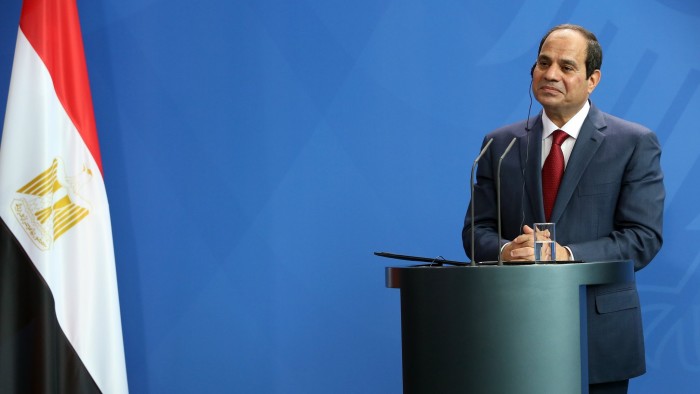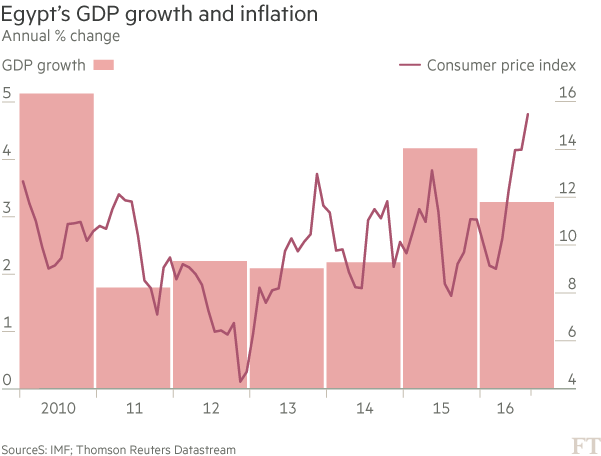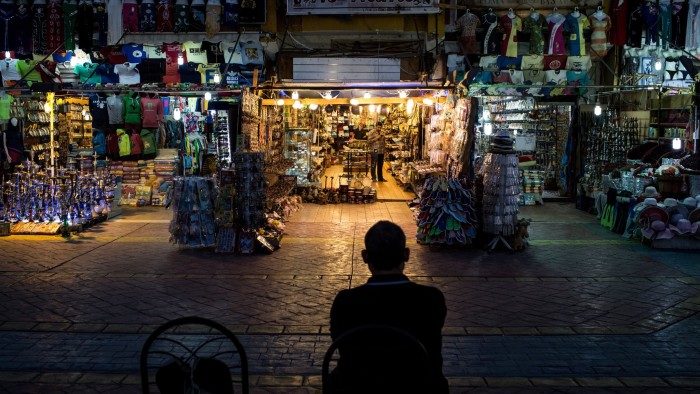President Sisi deploys army to tackle Egypt’s economic woes

Roula Khalaf, Editor of the FT, selects her favourite stories in this weekly newsletter.
Huge trucks loaded with baby milk rolled out of Alexandria port emblazoned with pictures of a smiling baby and a message for Egyptian parents: “Don’t pay more than 30 pounds. With the compliments of the armed forces.”
The trucks then fanned out across Egypt, distributing the imported infant formula to be sold at half the price charged by retailers — part of a military venture that illustrates how President Abdel Fattah al-Sisi is increasingly turning to the army to tackle the country’s economic woes.
An army spokesman described the move as part of efforts to combat the “greed of monopolists” and ease life for Egyptians. The initiative was announced last month after shortages caused suppliers to raise prices and prompted a rare protest by poor mothers carrying their infants.
It has turned a spotlight on the army’s widening footprint in the economy and its potential impact on the struggling private sector at a time when Mr Sisi, a former army chief who ousted his Islamist predecessor, is grappling with anaemic growth, weak investor confidence and rising poverty.
The military — traditionally a powerful actor in the economy — has over the past year announced a string of new ventures in which it either secured contracts with the government or which it planned to launch itself.

These include producing cement, supplying medical items to hospitals, running the government’s smart-card system for the distribution of subsidised goods, establishing fish farms and manufacturing water meters. Mr Sisi issued a law last year that allows the army to set up companies with the participation of domestic or foreign capital.
Critics on social media — the main arena for free expression in the country — have had a field day mocking the military’s baby milk imports. And even normally restrained media commentators have raised questions about the effects on the private sector.
Mr Sisi, whose government is hoping to secure a $12bn International Monetary Fund loan, responded last week by castigating those who would “cast doubt” on the army. He also sought to reassure businesses.
“No one should imagine that I would not support any sincere and honest investor working to benefit his country or to benefit himself. There are no limits . . . on people’s ability to work,” he said.

The military’s role in the economy traces its root to its need to supply a large standing army during wars with Israel in the 1960s and 1970s. After the two nations signed a peace treaty in 1979 the military branched out into more civilian sectors, including building infrastructure. But the scale of its activity has increased under Mr Sisi as Egypt’s economic crisis has deepened.
Investors have largely shunned the country in the wake of the 2011 revolution, while tourist numbers have dried up because of terrorist attacks and a severe foreign currency shortage is strangling business.
To many Egyptians enduring rampant inflation, the army — which has used its own farms and factories to pump cheap food into the market — has been performing a public service. But some businessmen fear it will be impossible to compete with an institution that has unrivalled political clout and is protected by law from revealing its accounts.
Emad al-Din Hussein, editor of the daily Shorouk, wrote that the military deserved “thanks” for stepping in to “solve problems”. But he also called on civilian and army leaders to “re-evaluate the participation of the armed forces in economic activity”.

“We should also discuss whether the participation of the army has impacted the size of local and foreign investment or not,” he wrote.
Omar al-Shenety, managing director of Multiples Group, a regional investment bank said the army had “stepped in to inject momentum in the economy at a time of great need”.
But he added that it would create unfair competition in some sectors.
“If a company is importing a product and the army comes in as an importer, the company can’t compete,” Mr Shenety said. “Despite having some justifications, we now have a new reality; there is direct competition between the army and some companies across various sectors.”
Mr Sisi is unapologetic about the military’s role. In a recent speech, he said that when senior military leaders asked him to run for president in early 2014 he made it “a condition” that the army would help him in his efforts to bolster the economy.
“I told them the challenges in Egypt are very, very, very tough . . . you have no choice but to put your hands in mine in rebuilding the Egyptian state,” he said.
Comments